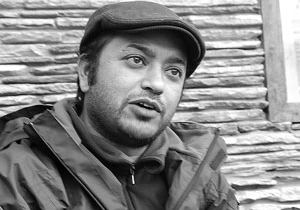In advance of a court hearing that will decide whether to extend the detention of student leader Gagan Thapa (photo) for allegedly criticizing the monarchy, the ICJ today called for his immediate release.
The ICJ also called for the amendment or repeal of the law that allows for the imprisonment of peaceful activists who legitimately criticize the monarchy.
Gagan Thapa was detained on 27 July 2005 and remanded in custody for seven days by a Special Court. He has reportedly been accused by the Kathmandu District Prosecutor of shouting slogans against the monarchy during a public demonstration on 25 July. Article 4(1) of the Offences Against the State Act (1989) punishes “anyone causing or attempting to cause hatred, malice or contempt by writing or by words, symbols or signs by any other means, directly or indirectly” against the King or members of the royal family with up to three years’ imprisonment. This is reportedly the first time this Act has been used since the King assumed full executive powers on 1 February.
“The use of this old and vague Act is another attempt by the Government to use the law to silence opposition. The King has assumed full executive powers and his government is now in effect seeking to silence criticism of both the King and the Government. Vibrant and often critical debate is at the heart of a democracy,” said Nicholas Howen, Secretary General of the ICJ.
“This newest action by the Government contravenes constitutional commitments to freedom of thought and expression and the right to peaceful assembly. It also contravenes commitments made by Nepal as a state party to the International Covenant on Civil and Political Rights (ICCPR)” concluded Nicholas Howen.
In a resolution (E/CN.4/2005/L.90 (3)) at the Commission on Human Rights in April 2005 the international community called on the Government of Nepal to restore freedom of opinion, expression and the press.
Background
Gagan Thapa was arrested on 26 April 2005 and held under the Public Security Act (PSA) that allows the authorities to detain a person who allegedly threatens the “sovereignty, integrity or public tranquillity” of Nepal for up to 90 days without charge or trial. He was released on 5 May after the Supreme Court ruled that his detention was illegal, but was immediately re-arrested. On 25 May, the Supreme Court again ordered his release, and he was freed from detention.
Student protests for the restoration of democracy and human rights have intensified over the past week. During the protests students have demanded the release of Gagan Thapa and six other student leaders who have been detained since 14 July, and the overturning of guilty verdicts handed down by a Royal Corruption Control Commission (RCCC) against political leaders.
(See ICJ Press releases, Government of Nepal continues to defy Supreme Court orders: The ICJ calls for immediate release of student leader, 5 May 2005 and ICJ calls on the Government of Nepal to respect Supreme Court orders and release illegally detained student leaders, 16 May 2005)
Nepal-use law critics-press release-2005 (full text in English, PDF)





